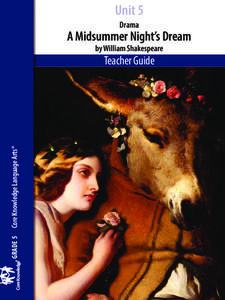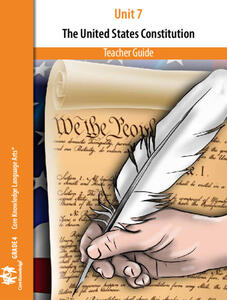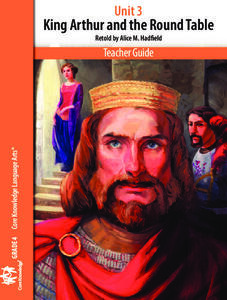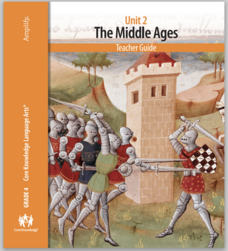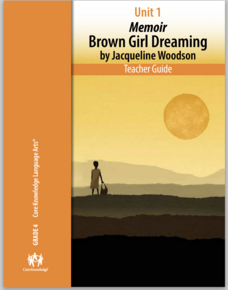Core Knowledge Foundation
Unit 9: The Science of Breakable Things by Tae Keller
A novel study examines The Science of Breakable Things by Tae Keller. Fifth graders participate in daily readings, discussions, and assignments following an "ask, explore, imagine, observe, and understand" routine. A final performance...
Core Knowledge Foundation
Unit 8: Native Americans
Over five weeks, fifth graders listen to and discuss reading passages that explore the connection between Native Americans and nature. Following daily readings, scholars practice word work, including prefixes, root words, suffixes,...
Core Knowledge Foundation
Unit 7: Poetry
Over the course of a 12-lesson language arts unit, young scholars analyze a variety of poems taking a close look at figurative language and tone. They learn to compare and contrast, improve comprehension, and identify settings. To...
Core Knowledge Foundation
Unit 6: The Reformation
Over three weeks, fifth graders read about and discuss the Reformation which saw religion and politics shift across Europe. Following daily readings, young scholars practice spelling, grammar, and morphology skills such as prefixes,...
Core Knowledge Foundation
Unit 5: A Midsummer Night’s Dream
Fifth graders analyze William Shakespeare's A Midsummer Night's Dream, paying close attention to character development, plot, and dialogue. With daily reading and thoughtful discussion, scholars take pen to paper to respond to journal...
Core Knowledge Foundation
Unit 4: The Renaissance
The Renaissance is the theme of a five-week unit designed to boost reading comprehension, spelling, vocabulary, and expository writing skills. Scholars listen to and discuss daily readings and engage in skills practice activities...
Core Knowledge Foundation
Unit 3: Adventures of Don Quixote
Fifth graders explore the Adventures of Don Quixote in a four-week language arts unit. Scholars listen to and discuss a new chapter each day as well as examine vocabulary and practice word work including suffixes, subject-verb agreement,...
Core Knowledge Foundation
Unit 2: Early American Civilizations
Fifth graders explore early American civilizations in a four-week ELA unit. Every lesson offers an opportunity to read and discuss a selected passage followed by word work that covers vocabulary, grammar, and morphology. Learners write...
Core Knowledge Foundation
Unit 1: Contemporary Fiction - They Call Me Güero: A Border Kid’s Poems by David Bowles
They Call Me Güero: A Border Kid's Poems by David Bowles is the focus of a five-week language arts unit unit. Fifth graders listen to various poems and participate in thoughtful discussions, examining vocabulary and learning new words in...
Core Knowledge Foundation
Unit 8: Treasure Island
Treasure Island by Robert Louis Stevenson is the focus of the final unit, emphasizing reading, writing, grammar, morphology, and spelling. Fourth graders read and discuss a chapter with every lesson, followed by word work—prefixes,...
Core Knowledge Foundation
Unit 7: The United States Constitution
Fourth graders delve into the United States Constitution in a unit designed to boost reading comprehension, grammar, and writing. During each lesson, scholars read through and discuss a new chapter and work with prefixes and verbs....
Core Knowledge Foundation
Unit 6: American Revolution
The American Revolution is the theme of a five-week unit that focuses on reading, grammar, morphology, and writing. Scholars read and respond to texts, practice spelling and word work, and write paragraphs. Assessments gauge comprehension.
Core Knowledge Foundation
Unit 5: Geology
Over four weeks, fourth graders participate in a geology-themed unit. Scholars listen to informational texts, discuss readings, and complete word work and grammar lessons. Writing practice includes drafting an informational pamphlet, a...
Core Knowledge Foundation
Unit 4: Listen, My Children - Poems for Fourth Graders
Over three weeks, fourth graders explore the world of poetry. They listen to authors such as Shel Silverstein and Maya Angelou, complete word work activities, and practice spelling skills. Budding poets take pen to paper with daily...
Core Knowledge Foundation
Unit 3: King Arthur and the Round Table
Over four weeks, fourth graders study King Arthur and the Round Table, retold by Alice M. Hadfield. Fifteen lessons take pupils through each chapter, complete word work, and the writing process to draft paragraphs, sentences, dialogue,...
Core Knowledge Foundation
Unit 2: The Middle Ages
Over four weeks, fourth graders read and discuss texts about the Middle Ages. They practice vocabulary, spelling, and grammar, such as nouns, adjectives, and verbs. Writing opportunities allow learners to boost their note-taking skills...
Core Knowledge Foundation
Unit 1: Memoir - Brown Girl Dreaming by Jacqueline Woodson
The memoir, Brown Girl Dreaming by Jacqueline Woodson, is the focus of a unit designed for fourth graders. Scholars begin each lesson with a warm-up, then listen to a read-aloud of a section of the book. Pupils complete word work,...
University of Minnesota
Memory Items
Ready to have an "unforgettable" time in science class? Try a fun and insightful activity, suitable for a wide age group of learners. Explore how human memory works when pupils try to remember objects they've seen before comparing the...
Carolina K-12
How Do I Pre-Register and Vote in North Carolina?
Did you know that in some states your pupils can pre-register to vote? Teach the advantages to pre-registering and engage the classroom in an intriguing discussion about youth voting trends. Class members participates in a live polling...
IPA Productions
A Christmas Carol - The Story
Thirty-six pages familiarize scholars with the story and vocabulary of A Christmas Carol by Charles Dickens. After reading and listening to an abbreviated version of the holiday tale learners show what they know about the sequence of...
Pace University
Grade 6-8 Living Things
What characterizes a living thing? Scholars explore the concept during a differentiated instruction unit on living things. They perform lab experiments to determine how animals adapt to stimuli, watch videos and learn about...
PBS
Map a Model Solar System
Creating a solar system map is a snap thanks to a hands-on activity! Science scholars explore the solar system by building it wherever they choose during an interactive from PBS's Space series. Users pick both the location and scale for...
University of Kansas
Newspaper in the Classroom
Newspapers aren't only for reading—they're for learning skills, too! A journalism unit provides three lessons each for primary, intermediate, and secondary grades. Lessons include objectives, materials, vocabulary, and procedure, and...
Magic of Physics
Forces Lab
Here's a force to be reckoned with in the physics classroom! Scholars discover the movements associated with tension, compression, and other common forces through a hands-on simulation. Pupils pull, push, and twist their way through each...






